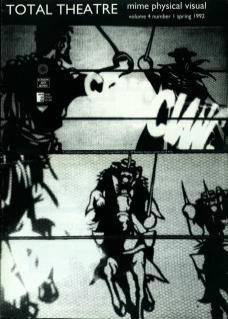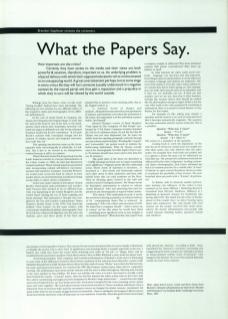How important are the critics?
Certainly they have access to the media and their views are both powerful & sensitive, therefore, important to us. An underlying problem is of paced delivery with which their supposed educated truth is communicated to an unsuspecting world. A gross overstatement perhaps, but at some stage in every critics life they will hurt someone (usually understood in a negative context by the injured party) and thus gain a reputation and a prejudice in which they in turn will be viewed by the world outside.
Writings from the Dance critics on this years "Spring Loaded" Festival have been interesting. The following are two reviews, by two different critics, of the respective styles and choreography of two different performances.
In the case of Laurie Booth & Company, the almost over eloquent Ann Nugent (Stage 27.2.92), hits the nail on the head in one of the best, to the point, articles I have read to date. Sometimes, however, I do think her jargon is definitely not only for the educated theatrical reader but for the connoisseur. "It is Laurie Booth's concern with conceptual change and his creation of unique spacial and temporal structures, that mark him out."
This opening introduction sums up the choreographer both chronologically & artistically, it's bril liant. But it has to be viewed in an interpretative context because it still is an opinion.
When I first saw Laurie Booth (just back from his South American travels) in a lecture demonstration at the Laban Centre in 1983, he had just discovered Copaeiro in Brazil. This is a South American movement style incorporating cultural self-defence movement, married with explosive acrobatics. Normally Westerners would come across this form by chance in town market places, its most flamboyant practitioners being young males in direct macho competition
At the time (quite unfairly in retrospect) I found Booth's observations quite pretentious and anachronistic because they seemed to be no different from what was happening in the United Kingdom and the United States (during the era of body popping and break dancing). This pretension I thought was compiled by the fact that London Contemporary Dance Theatre's, Robert North, in the 1970's had based the brilliant "Troy Games" on the same subject, with consummate symbolism & athletic choreography. Now Mr Booth has collated and digested, over the years, the rhythms, pace and sheer purity of the form and adapted this to present a most stunning style, that as Ms Nugent notices is, "a mystical world of shapes and symbols...Moments become marvellous encapsulations of balance and harmony even when the movement is off-centre, the impression is of the individual at peace within her/himself Edward Thorpe's review of Mark Murphy's "Time Spent In The Company Of Bad People" per formed by V-Tol Dance Company (London Standard 28.2.92) is of a derisory nature. Its not the fact that Mr Thorpe was not over impressed, but, he states his dislike from the opening paragraph onwards through sarcastic phrases and word play. Wording like "swiped" and "presumably" are potent words to indicate the forthcoming indictments. What Mr Thorpe actually says is the choreography has little depth (what it says in 70 minutes should have been said in less time,lets say 20 minutes)
The good parts of the show are described as "...briefly amusing and leads one to expect something more significant. Poignant points like the undressing scene, where clarity of statement is necessary, is described as "...they slowly and laboriously undress each other down to their underwear and then with baleful looks take up coital positions on the floor. Then its dressing again, back(s) to the wall and another round of changed partners". Mr Thorpe seems by descriptive assassination to achieve to criticise certain theatrical rules and patterning that must be present in any choreography as regards subject matter.
This article I find misleading because it seems the reviewer is placing a prejudice on what he believes to be contemporary dance. This is achieved by comparing V-Tol to the values and execution of DVS. He states that a company should "...hold a mirror up to nature" yet he also states he would have liked "...something more significant such as new insights in to human behaviour". What does the critic expect from a company, insight or reflection? Why dress informed opinion with poetic contradiction? Why dress up mutton as beef?
So what function do critics really serve? Certainly language can mis-lead and mis-represent. Everything is open to interpretation, it can be taken out of context. Language and opinion are subjective. The crux of the matter is, if it's the critics' role to inform us, we assume they know what's going on. This assumption can make them almost seem to be telepathic and if they are, we probably are too. If they are that sensitive and we are not, then that is their function. Perhaps like Ancient Greece they should be exalted like the philosophers and great sages? If this is not the case what really is the critics purpose? If everything is understood, there is no point in visual theatre, or any theatre for that matter.
For example it's like asking your mentor a question and the answer is on such an educated level that it becomes semantically enigmatic. The question becomes redundant and the answer irrelevant. This is a paradox
Question: "What does Y mean?"
Answer: "Yis X." Question: "What does X mean?
Answer: "X? That's Y." The answer is a metaphor of the question
Coming back to earth the importance of the critic has to be viewed in certain ways. It is simply not who takes notice, but, who believes who else takes notice. For example New York critics are exalted and it is agreed a shows life-span can be influenced on what they say. The prospective audiences inuist and are influenced by the critics' judgement. Leading commer cial dance choreographer, Jack Gunn, informed me that it is common practise for a mobile elite "A team" of dancers to open various Broadway shows in order to counteract the possibility of bad reviews. The now launched show proceeds with a "B team" of performers.
In Britain, with its relatively smaller performance industry, the influence of the critics is best summed up by Anne Millman Marketing Research Consultant from McCann, Matthews, Millman) at a Marketing & Research seminar for Southwark Arts during April 1991. She stated that the critics of theatre shows in this country have no direct bearing upon ticket sales whatsoever. The only people who read reviews are the people involved the artists them selves), the theatre administration and people with vested interests (funding bodies, sponsors, friends and relatives).

